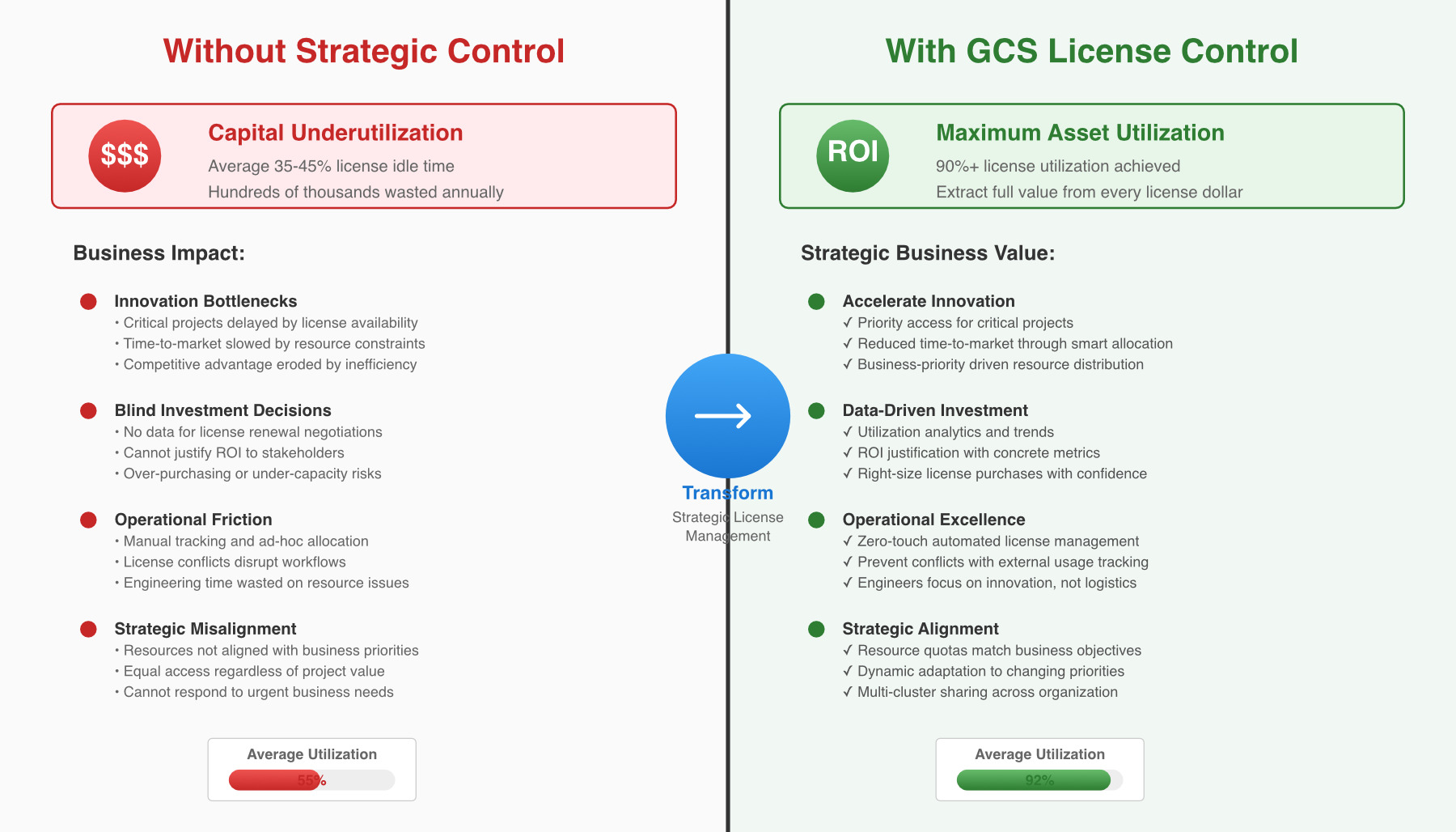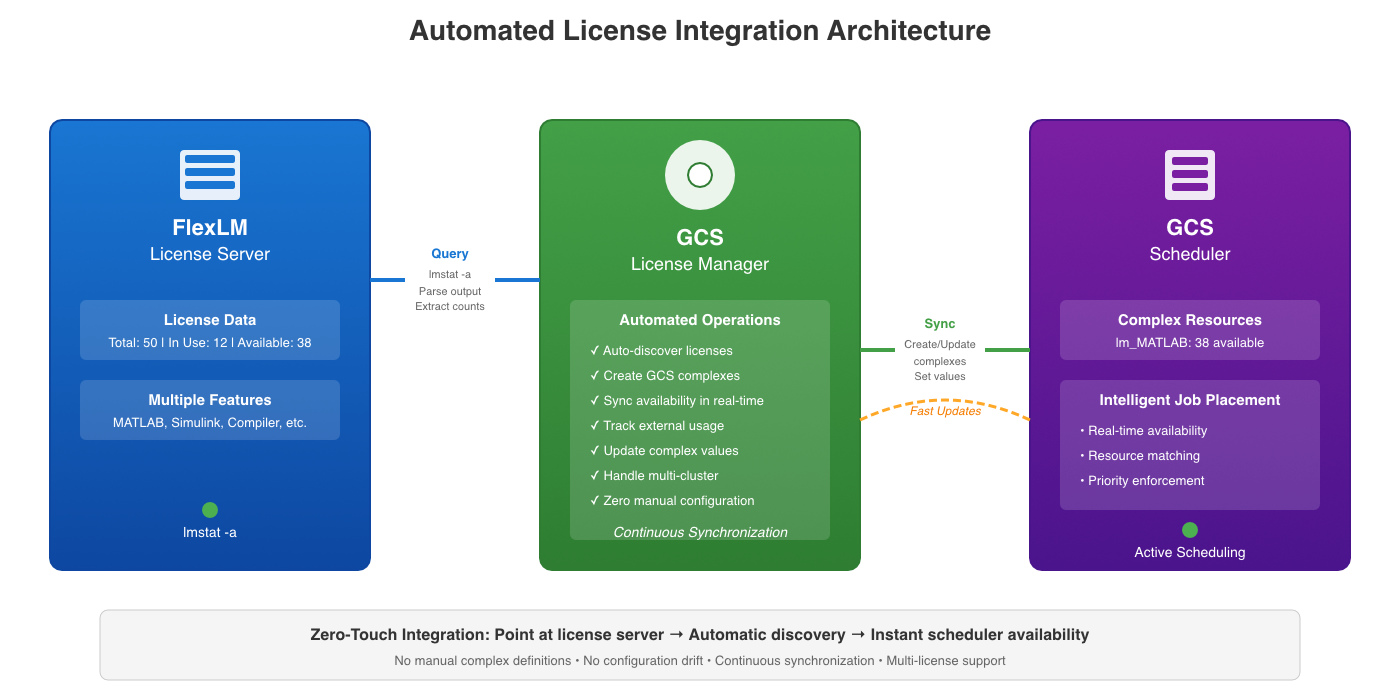The Hidden Cost of Underutilized Licenses
Commercial engineering and EDA software licenses represent a significant capital investment. These tools can cost tens of thousands of dollars per seat, yet many organizations face a painful dilemma: licenses sit idle while jobs wait in queue, or expensive seats are hoarded by long-running jobs that could share resources more efficiently.

Gridware Cluster Scheduler (GCS) transforms license management from a bottleneck into a competitive advantage.
Beyond Simple License Tracking
GCS doesn't just monitor license availability—it actively orchestrates license allocation to match your business priorities:
Fine-Grained Access Control: Resource quota sets let you define exactly who can access which licenses. Allocate licenses across departments, reserve seats for critical projects, or ensure research teams have guaranteed access during peak hours. No more ad-hoc policies or manual intervention.
Business-Aligned Priorities: Not all workloads are equal. Use GCS urgency values to prioritize license allocation for time-sensitive projects—product launches get priority access before routine analysis, critical simulations jump the queue. Your license spending directly supports your business objectives.
Dynamic Resource Adaptation: Business needs change. GCS adapts with you:
- Shift license quotas between departments as project priorities evolve
- Implement cost chargeback models to encourage efficient usage
- Apply time-based policies for maintenance windows or business-hour priority access
- Respond to seasonal demand patterns without manual reconfiguration
Zero-Touch License Integration
The new license manager integration eliminates setup friction entirely. Point GCS at your FlexLM license server and licenses are automatically discovered, mirrored, and made available to the scheduler. Adding a new license server? It's configured in minutes, not hours. No more manual complex definitions or configuration drift.

External License Usage Tracking: The license manager continuously monitors the actual license consumption—licenses grabbed outside of GCS control by interactive sessions, manual processes, or other systems. This real-world awareness prevents oversubscription and minimizes license conflicts. If someone launches an application directly on a workstation consuming a license, GCS accounts for the reduced availability and adjusts job scheduling accordingly.
Multi-Cluster License Sharing: Configure external license reservations to split license pools across multiple clusters or environments. Reserve 20 licenses for production cluster A, 15 for development cluster B. The license manager enforces these boundaries automatically, ensuring fair distribution while maximizing overall utilization across your entire organization.
The license-manager binary is currently available on request to Gridware Cluster Scheduler users and will be included as a standard component in the upcoming GCS 9.0.9 patch release, making this powerful capability available to all customers out of the box.
Fine-Tuning for Your Workload
Every organization has unique needs. GCS license management can be optimized across multiple dimensions to match your priorities:
License-Focused Optimization: Prioritize maximizing license utilization when licenses are your primary constraint. Configure policies that aggressively schedule jobs to use available licenses, potentially leaving compute resources idle to ensure expensive license seats never sit unused.
Hardware-Focused Optimization: When compute resources are scarce but licenses are plentiful, optimize for maximum hardware occupation. Allow jobs to queue for licenses while ensuring every CPU core and GPU is actively processing work.
Balanced Optimization: Strike the optimal balance between license efficiency and hardware utilization. GCS policy framework lets you define sophisticated rules that consider both dimensions simultaneously, adapting dynamically to changing resource availability.
This flexibility ensures GCS adapts to your specific bottlenecks rather than forcing you to adapt to rigid tooling constraints.
Visibility Drives Optimization
You can't optimize what you can't measure. GCS qtelemetry provides the foundation for comprehensive license analytics and broader cluster insights:
License Analytics:
- Build Grafana dashboards showing real-time license utilization
- Store metrics in time series databases, SQL databases with the SQL DB accounting and reporting integration, or both for trend analysis
- Identify underutilized licenses before renewal negotiations
- Demonstrate ROI and justify license expansions with data
- Leverage SQL database integration for complex queries and custom reporting
Cluster Resource Intelligence: qtelemetry data reveals more than just license usage—it exposes the complete resource picture:
- Identify compute bottlenecks competing with license constraints
- Discover memory limitations affecting job throughput
- Track storage I/O patterns impacting workload performance
- Correlate resource constraints with business impact
This comprehensive visibility enables data-driven decisions about infrastructure investments, license renewals, and policy adjustments.
The Bottom Line
Gridware Cluster Scheduler transforms expensive software licenses from a constraint into a managed resource. Maximize utilization, align allocation with business priorities, eliminate manual configuration overhead, and gain the visibility needed for continuous optimization.
With the new license manager integration coming to GCS 9.0.9, sophisticated license management becomes turnkey rather than a custom integration project.
Your licenses are too valuable to manage with spreadsheets and hope.
Discover More
To learn more about how Gridware can improve your HPC and AI workloads, contact us for a personalized consultation at dgruber@hpc-gridware.com.





